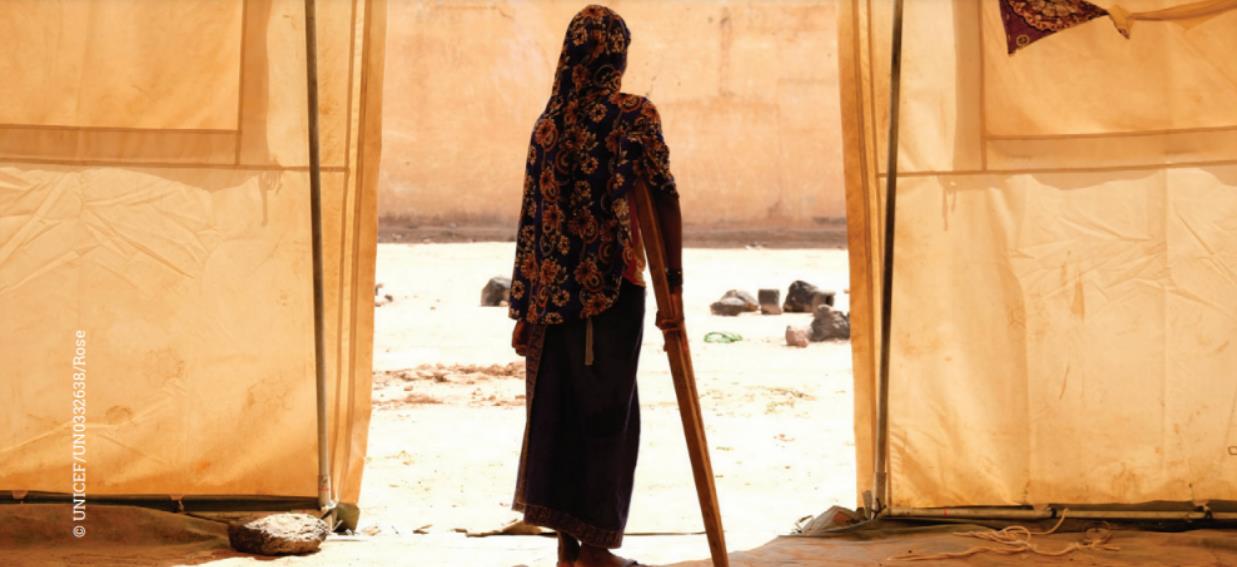A Call for Action on Disability Inclusive Humanitarian Commitments
Reference Group on Inclusion of Persons with Disabilities in Humanitarian Action launches a Call for Action on Disability Inclusive Humanitarian Commitments.
- 16 December 2021

Last week, the Reference Group on Inclusion of Persons with Disabilities in Humanitarian Action (DRG) launched a Call for Action on Commitments to Disability Inclusive Humanitarian Action ahead of the Global Disability Summit.
The Group is a platform fostering cooperation between UN, International Agencies, NGOs, and organizations of persons with disabilities in promoting disability inclusive humanitarian response, including, but not limited to, supporting the development, dissemination, and implementation of key guidance materials. The group has over 200 members and welcomes any entity working to promote the rights of persons with disabilities in humanitarian emergencies to join.
As part of their mandate, the DRG is calling on governments, multilateral agencies, and civil society to make concrete commitments for advancing the rights of the over 41 million children and adults with disabilities impacted by humanitarian emergencies.
In this regard, they are calling on all partners to commit to:
- Build strong partnerships with Organisations of Persons with Disabilities (OPDs) as leading partners in emergency preparedness and response, and particularly to support leadership and participation by persons with disabilities impacted by humanitarian emergencies, including children, young people, and adults from more marginalized groups
- Increase resourcing of disability inclusive humanitarian action
- Strengthen capacity on a rights-based approach to disability inclusive humanitarian action
- Make humanitarian action inclusive of children and adults with disabilities throughout the humanitarian programme cycle, including in needs assessment, monitoring, reporting, and the design of feedback and complaints mechanisms
- Make all aspects of emergency preparedness and response accessible to children and adults with disabilities, including those with physical, sensory, intellectual, and psychosocial disabilities
- Make all humanitarian assistance accessible to children and adults with disabilities, including distribution of food and non-food items; shelter; water, sanitation and hygiene; education; protection; health and nutrition interventions
- Take measures to ensure that cash-based interventions are accessible and inclusive of persons with disabilities and their households, and do not increase protection risks
- Contribute to improved access by populations affected by humanitarian emergencies to quality and appropriate assistive technology (AT), including assistive products and related services
- Ensure a disability inclusive approach to mixed movements of people, including improving access to national service systems for refugees, internally displaced persons, and migrants
- Make asylum procedures and durable solutions inclusive for persons with disabilities, including by reinforcing the protection of persons with disabilities within asylum systems and resettlement submissions, and by determining (safe and dignified) conditions for return
- Strengthen the voice and participation of persons with disabilities and their representative organizations in decision-making and planning processes to strengthen health systems as part of preparedness and recovery efforts, promoting access and inclusion of persons with disabilities in health emergency response
- Include persons with disabilities in disaster mitigation and preparedness, including for sudden and slow onset disasters linked to climate change
- Ensure that persons with disabilities and their representative organizations have opportunities to participate in the peace continuum, including in conflict prevention, resolution, reconciliation, reconstruction, and peacebuilding
- Protect children and adults, especially women and girls with disabilities from violence, exploitation, and abuse, including through inclusive child protection interventions and gender based violence risk mitigation.
You can download a PDF of the Call for Action here.
Recent posts
- Reporting is open for GDS Commitments!
- CALL FOR PROPOSALS - Global Disability Summit Grants
- Keep up with post-Global Disability Summit events!
- First day of Global Disability Summit Results in ground-breaking Commitments to Disability Rights from Global Leaders
- Global Disability Summit 2022 (GDS22) in the News
- World Leaders join Together for Global Disability Summit 2022
- Gearing up for the Global Disability Youth Summit on 14 February 2022
- Disability is Everyone's Business
- Global Disability Summit 2022 (GDS22) Side Events Toolkit
- No Lost Generation